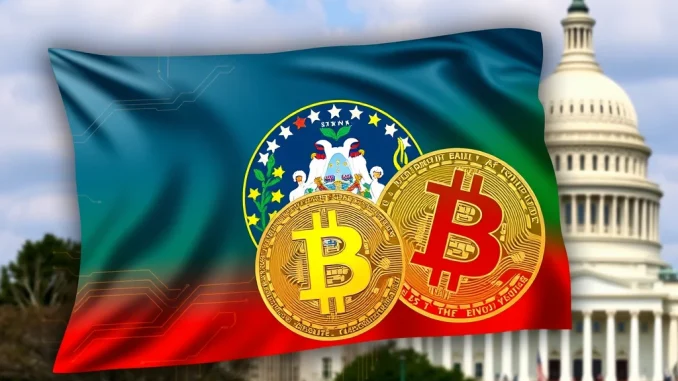
Exciting news for Bitcoin enthusiasts! New Hampshire is making headlines with a potentially game-changing move into the world of cryptocurrency. Are you ready to learn about the state’s bold step towards embracing Bitcoin? Let’s dive into the details of the groundbreaking Bitcoin reserve bill that just passed a crucial hurdle in the Granite State.
What is the New Hampshire Bitcoin Reserve Bill All About?
The New Hampshire House of Representatives has recently approved House Bill 302, also known as the Bitcoin reserve bill. In essence, this legislation proposes a significant shift in how the state manages its public funds. Imagine a state government directly investing in Bitcoin – that’s precisely what HB302 aims to achieve. According to reports from Watcher Guru and various crypto news outlets, the bill, if enacted, would allow New Hampshire to allocate up to 5% of its total public funds into a Bitcoin (BTC) reserve.
Let’s break down what this could mean:
- Direct Bitcoin Investment: Unlike indirect exposure through ETFs or Bitcoin-related companies, this bill proposes a direct investment in Bitcoin itself.
- 5% Allocation Cap: The bill sets a limit, suggesting that no more than 5% of the state’s public funds would be dedicated to this Bitcoin reserve. This is a cautious yet significant initial step.
- State-Level Adoption: New Hampshire could potentially become one of the first states in the US to officially hold Bitcoin on its balance sheet.
Why is New Hampshire Considering a Bitcoin Reserve?
What’s driving this interest in Bitcoin adoption at the state level? Several factors could be at play:
- Diversification: States often look for ways to diversify their treasury holdings to mitigate risk and potentially enhance returns. Bitcoin, as a nascent asset class, could be seen as an alternative to traditional reserves.
- Inflation Hedge: With ongoing concerns about inflation, some view Bitcoin as a potential hedge against the devaluation of fiat currencies. Holding a portion of reserves in Bitcoin could be seen as a proactive measure to protect against inflationary pressures.
- Technological Innovation: Embracing Bitcoin can be interpreted as a forward-thinking move, positioning New Hampshire as a state that is open to and supportive of technological innovation in the financial sector.
- Economic Opportunity: By becoming a crypto-friendly state, New Hampshire might attract businesses and talent in the burgeoning cryptocurrency industry, potentially boosting its economy.
What are the Potential Benefits of State Bitcoin Investment?
If New Hampshire proceeds with establishing a Bitcoin reserve, what benefits could it potentially reap?
| Benefit | Description |
|---|---|
| Financial Diversification | Bitcoin’s low correlation with traditional assets like stocks and bonds can enhance portfolio diversification and reduce overall risk. |
| Potential for Higher Returns | Bitcoin has historically shown significant price appreciation, offering the potential for higher returns compared to traditional low-yield government bonds. |
| Hedge Against Inflation | Bitcoin’s scarcity and decentralized nature are seen by some as a robust defense against inflation, preserving the purchasing power of state funds. |
| Attracting Innovation and Investment | A pro-Bitcoin stance could attract crypto-focused businesses, investors, and tech talent to New Hampshire, fostering economic growth. |
| Signaling Future-Forward Thinking | Embracing Bitcoin sends a message that New Hampshire is a state that embraces innovation and is preparing for the future of finance. |
What Challenges and Considerations Exist?
While the potential benefits are compelling, venturing into state Bitcoin investment is not without its challenges. It’s crucial to consider the potential hurdles and risks involved:
- Price Volatility: Bitcoin is known for its price swings. A Bitcoin reserve would be subject to this volatility, potentially leading to significant fluctuations in the value of state holdings.
- Regulatory Uncertainty: The regulatory landscape for cryptocurrencies is still evolving. Changes in regulations at the federal or state level could impact the legality and management of a Bitcoin reserve.
- Security and Custody: Securely storing and managing Bitcoin holdings is critical. States would need robust security measures to protect their Bitcoin reserve from theft or loss.
- Public Perception and Political Scrutiny: Investing public funds in a volatile asset like Bitcoin could face public criticism and political opposition, especially if the price declines.
- Operational Complexity: Managing a Bitcoin reserve involves new operational complexities, including understanding blockchain technology, managing private keys, and navigating the crypto market.
What’s Next for the New Hampshire Bitcoin Bill?
The passage of HB302 in the House is a significant step, but it’s not the final hurdle. The bill now moves to the State Senate for consideration. If it passes the Senate, it would then need to be signed into law by the Governor to become effective. The journey of this Bitcoin reserve bill is still ongoing, and its ultimate fate remains to be seen.
It’s important to keep an eye on the legislative process in New Hampshire. The progress of HB302 could set a precedent for other states considering similar initiatives. Will other states follow New Hampshire’s lead in exploring Bitcoin adoption for their state reserves? The coming months will be crucial in observing how this unfolds.
Actionable Insights: What Can We Learn from New Hampshire’s Bitcoin Initiative?
Regardless of the final outcome of HB302, New Hampshire’s Bitcoin reserve bill offers valuable insights for individuals, businesses, and other governmental bodies interested in cryptocurrency:
- Exploration is Key: New Hampshire’s initiative highlights the importance of exploring and understanding new technologies and asset classes, even if they seem unconventional at first.
- Cautious and Measured Approach: The 5% cap demonstrates a measured approach to Bitcoin investment, acknowledging both the potential and the risks involved.
- Public Dialogue is Essential: The debate surrounding HB302 underscores the need for open and informed public dialogue about the role of cryptocurrencies in finance and governance.
- Security and Risk Management are Paramount: Any entity considering Bitcoin investment must prioritize robust security measures and comprehensive risk management strategies.
- Regulatory Monitoring is Crucial: Staying informed about the evolving regulatory landscape for cryptocurrencies is essential for making informed decisions.
In Conclusion: A Bold Step into the Future of Finance?
New Hampshire’s Bitcoin reserve bill is undoubtedly a bold and noteworthy development in the ongoing saga of cryptocurrency adoption. Whether it ultimately becomes law or not, it sparks an important conversation about the potential role of Bitcoin in state finances and serves as a fascinating case study in state Bitcoin investment. Keep watching this space as New Hampshire potentially pioneers a new frontier in the intersection of government and digital assets!



